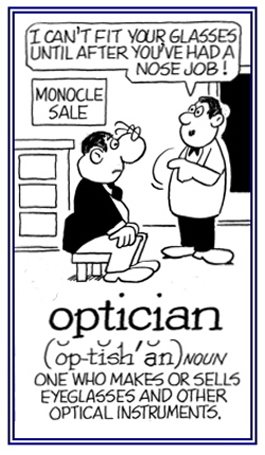optic
Concerned with, or descriptive of, the eye or vision.
optic angle
The visual angle formed by the optical axes of the two eyes when directed to the same point.
optic aphasia
(s) (noun), optic aphasias
(pl)
Loss of the ability to name an object clearly seen until it has been perceived through some other sense; such as hearing, touching, smelling, or tasting.
optic atrophy
A deterioration in the fibers of the optic nerve resulting in partial or a complete loss of vision.
It may be caused by damage to the nerve from inflammation or injury, or the atrophy may be a result of a disease in the eye.
optic disk
1. The circular area in the retina that is the site of the convergence of fibers from the ganglion cells of the retina to form the optic nerve.
2. Otherwise known as the "blind spot" of the eye, the disc is the beginning of the optic nerve; the point where nerve fibers from the retina's rods and cones (the light-sensitive and color-sensitive cells) leave the eyeball.
optic nerve
The second cranial nerve; the sensory nerve that innervates the retina.
optic neuritis
Acute impairment of vision in one eye or both eyes, which may be affected simultaneously or successively; and which may recover spontaneously or leave the patient with a scotoma or scotomas; or even blindness.
Scotoma refers to an area of lost, or depressed vision, within the visual field; surrounded by an area of a less depressed, or of normal, vision.
optical
1. Belonging to, or relating to, the sense of sight.
2. Relating to, or producing, light that can be seen.
3. A description of an instrument or device that is sensitive to light.
4. Describing a lens that is designed to correct, or to enhance, faulty vision.MBR<
5. Belonging, or relating to, the science of optics.
optical concentrator
A lens, or mirror system, that concentrates radiant solar energy in a concentrating photovoltaic system (devices that absorb solar energy turned into electricity) in order to increase electrical output.
optician
(s) (noun), opticians
(pl)
A specialist in fitting eyeglasses and making lenses to correct vision problems: The
opticians fill the prescriptions made by optometrists who have performed the examinations of the eyes for corrective lenses.
 © ALL rights are reserved.
© ALL rights are reserved.
Go to this Word A Day Revisited Index
so you can see more of Mickey Bach's cartoons.
opticianry
The application of the art and science of optics to the compounding, filling, and adapting of ophthalmic prescriptions.
opticofacial
Referring to the optic and facial nerves.
opticophilist
(s) (noun), opticophilist
(pl)
A collector of eye glasses: Sally had an interesting hobby of saving optical instruments with frames used for correcting defective eyesight. As an opticophilist, she had some modern dark glasses or sunglasses, some bifocals, and pince-nez ones that were very old!
optics
1. The branch of physics that deals with light and vision; primarily, the generation, propagation, and detection of electromagnetic radiation having wavelengths greater than x-rays and shorter than microwaves.
2. When referring to a singular noun, it means, the study of light or electromagnetic radiation in the visible, infrared, and ultraviolet regions.
3. As a plural noun, it refers to instruments used for detecting electromagnetic radiation and for attaining highly accurate long-range vision.
optogenetics
The science of isolating and communicating with specific types of neurons using light with a combination of optics and genetics that may allow neuroscientists to identify and to control brain circuits with greater precision.
Because of specialized hardware applications which need to be developed, it may be many years before optogenetics can offer a reliable diagnosis, much less any definitive cure for Parkinson’s disease or any other major brain illness or disorder.
—Compiled from information presented by
"A Light in the Brain" by Gary Stix in Scientific American;
January, 2010; pages 10 & 11.
and
"A healthy future for optogenetics" by Jeff Bairstow;
in the Laser Focus World; August 1, 2009.
Related references to "eye" or "eye part" word families:
blepharo-;
core-;
corneo-;
eye, eyes;
irido-;
lenti-, lens-;
lenticulo-;
ocelli-;
oculo-;
ophthalmo-;
phaco-;
pupillo-;
retino-;
uveo-.
Cross references of word families that are related directly, or indirectly, to: "appear, visible, visual, manifest, show, see, reveal, look":
blep-;
delo-;
demonstra-;
-orama;
pare-;
phanero-;
phant-;
pheno-;
scopo-;
spec-;
vela-, veal-;
video-, visuo-.



